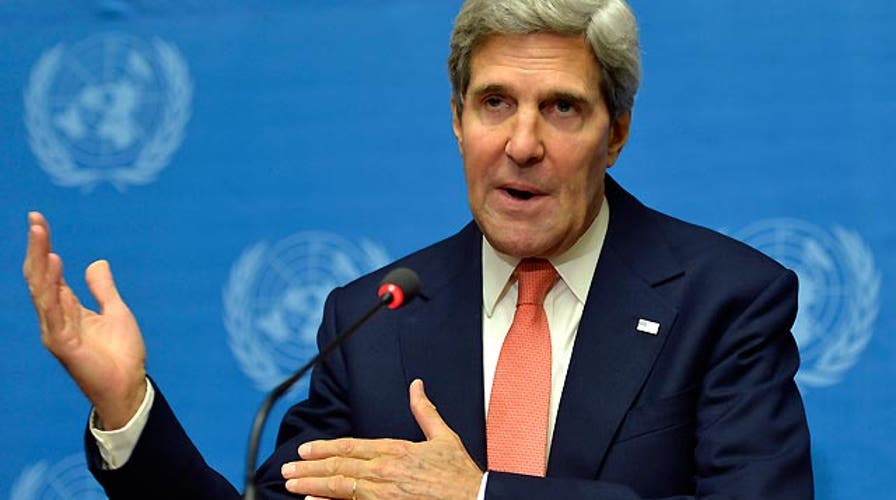Kerry carrying the ball for administration in Geneva
Negotiations continue with Russian counterpart
Secretary of State John Kerry and Russian Foreign Minister Sergey Lavrov have reached an agreement on a framework for securing Syria's chemical weapons on the third day of intense negotiations in Geneva.
Syria has one week to comply. And if Syrian leaders fail to comply, the United States and Russia will seek a United Nations Security Council resolution, Kerry and Lavrov said.
At a news conference Saturday, Kerry said the pair and their teams of experts had reached "a shared assessment" of the existing stockpile and that Syria must destroy all of its weapons.
Kerry said, "we have committed to a standard that says, verify and verify." The negotiations between the United States and Russia on securing Syria's chemical weapons also are considered key to a resumption of peace talks to end the 2 1/2-year Syrian civil war.
A spokesman for the U.N. Secretary-General Ban Ki-moon said after the announcement: "The secretary-general looks forward to learning more of this framework agreement and pledges the support of the United Nations in its implementation. The Secretary-General expresses his fervent hope that the agreement will, first, prevent any future use of chemical weapons in Syria and, second, help pave the path for a political solution to stop the appalling suffering inflicted on the Syrian people."
The Obama administration welcomed the agreement but made clear that the use of military force is still an option.
"While we have made important progress, much more work remains to be done," President Obama said. "The United States will continue working with Russia, the United Kingdom, France, the United Nations and others to ensure that this process is verifiable, and that there are consequences should the Assad regime not comply with the framework agreed today. And, if diplomacy fails, the United States remains prepared to act."
Pentagon spokesman George Little said: "We haven't made any changes to our force posture to this point. The credible threat of military force has been key to driving diplomatic progress. And it's important that the Assad regime lives up to its obligations under the framework agreement.
The U.N. secretary-general said Friday that he expected "an overwhelming report" that chemical weapons were indeed used on the outskirts of Damascus on Aug. 21. Obama called for a limited military strike against Bashar Assad's forces in response, then deferred seeking congressional approval to consider the Russian proposal.
Senior U.S. officials in Washington have said they do not expect the U.N. resolution will ultimately include the threat of military force, considered how Russia has repeatedly blocked such language at the U.N.
Meanwhile, sensing perhaps that the threat of a U.S. strike is no longer imminent, Assad is publicly trying to strengthen his hand. In an interview with Russian television, he not only demanded the U.S. drop the threat of military action -- he also said the Obama administration must stop arming the opposition.
"When we see that the U.S. genuinely stands for stability in our region, stops threatening us with military intervention and stops supplying terrorists with weapons, then we will consider it possible to finalize all necessary procedures and they will become legitimate and acceptable for Syria," Assad said, according to the translation by Russia's RIA Novosti. "Terrorists" is the term Assad often applies to members of the Syrian opposition.
The Obama administration decided months ago to start arming the Syrian opposition, after prior evidence of chemical weapons use. Media reports this week said the CIA, after a significant delay, has started to deliver small arms to the rebels.
Assad made one other request that might be difficult to satisfy. He said that all countries in the area must honor anti-chemical weapons agreements, "and the first country to do so is Israel because it possesses nuclear, chemical and biological weapons -- all types of weapons of mass destruction."
Israel signed the Chemical Weapons Convention 20 years ago, but did not end up ratifying it. The Assad government now claims effectively to be a party to that weapons agreement. But Syrian government officials say they need a month to submit data on their stockpiles. Kerry objected to that time frame on Thursday, suggesting that was too long.
On Friday, Sen. John Cornyn, R-Texas, made a demand of his own, writing a letter to Kerry saying that bioweapons should also be included in the disarmament talks with Syria.
"I remain highly skeptical of Russia's true intentions, but I believe omitting Assad's bioweapons from any agreement would represent a gaping hole in the plan and would not adequately protect U.S. national security interests," he said.
Others in Washington warned that Assad and Russia's Vladimir Putin are turning the tables on the U.S. "They're just kind of playing with us," Rep. Buck McKeon, R-Calif., chairman of the House Armed Services Committee, told Fox News on Friday.
Kerry, on Thursday, stressed that the negotiations are not a "game," and that the U.S. must keep the threat of military action on the table in order to keep the pressure on Assad. The military build-up continues, as Russia reportedly dispatched several ships to the eastern Mediterranean, while the U.S. keeps its ships in position in the region.
Kerry planned to travel to Jerusalem Sunday to discuss the situation in Syria with Israeli Prime Minister Benjamin Netanyahu. He will then go to Paris to see French Foreign Minister Laurent Fabius and British Foreign Secretary William Hague on Monday about the Syrian war. In Paris, he will meet separately with Saudi Foreign Minister Saud al-Faisal.
The Associated Press contributed to this report.





